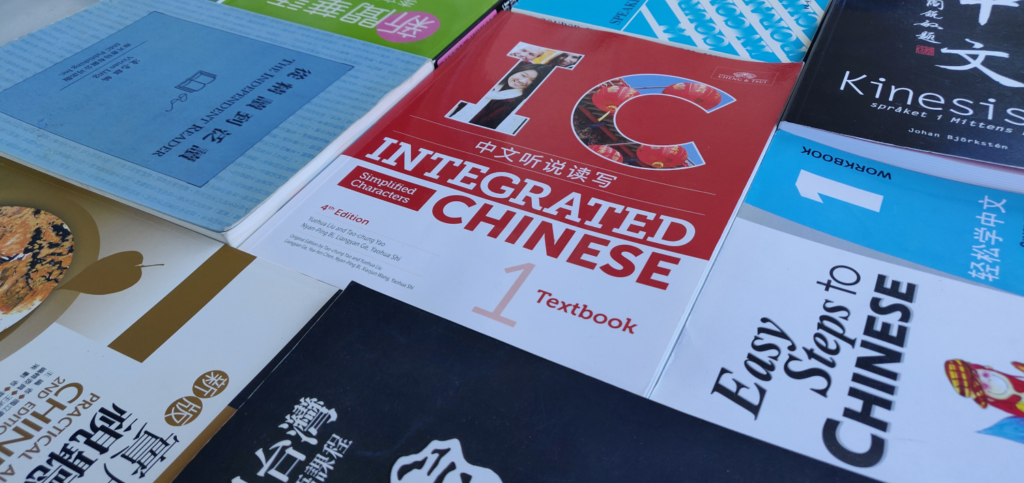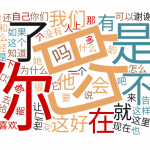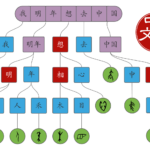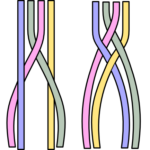
Have you used a textbook to learn Chinese? Most students will say yes, because textbooks are popular not just in formal education, but also outside classrooms, where they can provide extra structure and guidance.
Still, the most common method is not always the best one, and you don’t have to search online for long to find people who say that textbooks are holding you back, and that you should throw them away to unleash your full potential.
So should you throw away your Chinese textbook? Let’s find out!
Tune in to the Hacking Chinese Podcast to listen to the related episode:
Available on Apple Podcasts, Google Podcast, Overcast, Spotify, YouTube and many other platforms!
Are Chinese textbooks useful? For whom?
On Hacking Chinese, my goal is to help you learn Mandarin in a better way. That means that I focus on you as an individual student, not a whole class of students. Textbooks might offer certain benefits for teachers, schools, or whole education systems, but that’s not what I’m interested in today. The fact that using a textbook saves your teacher time is irrelevant for whether or not you should use a textbook or not.
I don’t know you personally, however, and your particular situation does influence how useful a textbook is. My hope is that by reading the following discussion, you’ll be in a better position to judge if you should throw away your textbook, or if not what you should use it for.
The most important individual factor is your level of Chinese. The need for textbooks decreases the more Chinese you know. As a beginner, everything is new and you have have more questions that you can possibly find answers for:
- What should you learn first?
- How does Chinese characters work?
- What tools should you use?
- How does word order work in Chinese?
- What are tones?
A textbook introduces useful language in context and explains how it works. It gives you a path to follow and makes many choices for you, including ones you might not be aware of yet. Instead of spending a few months figuring out how you want to learn Chinese, a textbook allows you to get started right away and figure out the details later.
As a more advanced student, you know your way around, and even if you haven’t mastered the language yet, you do at least know what you don’t know. This means you’re in a better position to take control of your own learning, with or without a textbook.
Let’s have a closer look at some advantages of using textbooks to learn Chinese!
5 reasons why you shouldn’t throw away your Chinese textbook
 Textbooks contain language that is common and useful for students. This selection is valuable, because the authors’ guesses are better than most, and they also avoid overly complicated language that would be a waste of time at your current level. Thus, anything you find in a beginner textbook can be counted on being useful. Naturally, it’s rarely a good idea to study words from a list, but most textbooks do a decent job of integrating words in dialogues and texts. If you’re a beginner, this is very important, as this is often your only chance of being able to make sense of any Chinese. If you’re a more advanced student, this selection is still useful if it’s in a specific area you want to learn more about. Read more about the most common Chinese characters and words here.
Textbooks contain language that is common and useful for students. This selection is valuable, because the authors’ guesses are better than most, and they also avoid overly complicated language that would be a waste of time at your current level. Thus, anything you find in a beginner textbook can be counted on being useful. Naturally, it’s rarely a good idea to study words from a list, but most textbooks do a decent job of integrating words in dialogues and texts. If you’re a beginner, this is very important, as this is often your only chance of being able to make sense of any Chinese. If you’re a more advanced student, this selection is still useful if it’s in a specific area you want to learn more about. Read more about the most common Chinese characters and words here. Textbooks provide structure. While each student is unique and should plot their own path towards reaching their goals, this plotting is difficult and takes time. If you were to make your own decisions about everything, such as what to read next, what grammar to learn, what characters to study, what bits of cultural trivia to cover, and so on, this would take up a significant portion of your time and energy, which you could have used for learning more Chinese instead. When you know clearly what you want or need to learn, you don’t need a textbook, but before you do, using a textbook provides much needed structure. This is similar to how many people use the proficiency test HSK as a roadmap for learning Chinese. Textbooks also give you a cleara sense of making progress as you work your way through the chapters, but remember than measurable progress is a double-edged sword.
Textbooks provide structure. While each student is unique and should plot their own path towards reaching their goals, this plotting is difficult and takes time. If you were to make your own decisions about everything, such as what to read next, what grammar to learn, what characters to study, what bits of cultural trivia to cover, and so on, this would take up a significant portion of your time and energy, which you could have used for learning more Chinese instead. When you know clearly what you want or need to learn, you don’t need a textbook, but before you do, using a textbook provides much needed structure. This is similar to how many people use the proficiency test HSK as a roadmap for learning Chinese. Textbooks also give you a cleara sense of making progress as you work your way through the chapters, but remember than measurable progress is a double-edged sword. Textbooks explain how Chinese works. This is not necessary when children learn languages, but understanding roughly what’s going on is helpful for adult learners. This is especially true if you don’t have someone who’s willing to talk to you all the time in level-adjusted Chinese, spoon-feeding the input you’d need to figure out things for yourself. A good example of this is that having a basic understanding of how characters work make them easier to learn. Still, don’t confuse learning about words and grammar with actually being able to use them. Chinese is best learnt implicitly through exposure with only a seasoning of explicit instruction.
Textbooks explain how Chinese works. This is not necessary when children learn languages, but understanding roughly what’s going on is helpful for adult learners. This is especially true if you don’t have someone who’s willing to talk to you all the time in level-adjusted Chinese, spoon-feeding the input you’d need to figure out things for yourself. A good example of this is that having a basic understanding of how characters work make them easier to learn. Still, don’t confuse learning about words and grammar with actually being able to use them. Chinese is best learnt implicitly through exposure with only a seasoning of explicit instruction. Textbooks are more reliable than most other learning materials. While even the biggest published textbook series contain errors and incorrect information (see more in 7 things you were taught in Chinese class that are actually wrong), they are still edited to a point where this is rare. The Chinese texts in them have been through many rounds of editing and are exactly like they are for a reason. This is not true for many cheaper, online learning resources, where there might be no proof-reading, where the content is written by one person without any external editing, and where the writer might not even have the relevant qualifications. Textbooks are not perfectly reliable, but they are more reliable than most other learning resources.
Textbooks are more reliable than most other learning materials. While even the biggest published textbook series contain errors and incorrect information (see more in 7 things you were taught in Chinese class that are actually wrong), they are still edited to a point where this is rare. The Chinese texts in them have been through many rounds of editing and are exactly like they are for a reason. This is not true for many cheaper, online learning resources, where there might be no proof-reading, where the content is written by one person without any external editing, and where the writer might not even have the relevant qualifications. Textbooks are not perfectly reliable, but they are more reliable than most other learning resources. Textbooks provide you with ways of engaging with the content you have learnt. While I think exercises and learning activities are the weakest point in many textbooks, they can still be quite useful. For example, a listening exrceise which is built on the words and grammar you have learnt so far, but uses it to present new content, is awesome and difficult to create on your own. One of the best parts of many textbooks is the consolidating extra chapters meant to review a whole unit, where language is recycled and practised without introducing much new content. This type of fluency development is extremely important, but unfortunately not very common. When it comes to speaking and writing, it’s a bit of hit and miss when it comes to quality and you often need classmates or a teacher, so these will be less useful for students who are entirely on their own.
Textbooks provide you with ways of engaging with the content you have learnt. While I think exercises and learning activities are the weakest point in many textbooks, they can still be quite useful. For example, a listening exrceise which is built on the words and grammar you have learnt so far, but uses it to present new content, is awesome and difficult to create on your own. One of the best parts of many textbooks is the consolidating extra chapters meant to review a whole unit, where language is recycled and practised without introducing much new content. This type of fluency development is extremely important, but unfortunately not very common. When it comes to speaking and writing, it’s a bit of hit and miss when it comes to quality and you often need classmates or a teacher, so these will be less useful for students who are entirely on their own.
As you can see, I think there are many good reasons to use a textbook to learn Chinese, especially if you’re a beginner. If you don’t know which textbook to pick, here are a few popular examples with some minimal comments from me:
- Integrated Chinese (choose simplified or traditional characters; suitable for self-study)
- New Chinese Practical Reader (simplified or traditional characters)
- A Course in Contemporary Chinese (traditional characters; popular in Taiwan)
- Practical Audio-Visual Chinese (traditional characters; also focused on Taiwan, but older than the previous textbook)
- Easy Steps to Chinese (simplified characters)
However, this article is about both pros and cons, so let’s turn to the disadvantages of using textbooks to learn Chinese. There’s a reason why some people advice you to throw away your textbook!
6 reasons why you should throw away our Chinese textbook
Before I go through some of the downsides of using a textbook to learn Chinese, I want to clarify that I’m talking about mainstream textbooks in general. There will always be specific textbooks that manage to avoid some of the disadvantages listed below and might be particularly useful for certain students, but this discussion is about textbooks in general.
So, why should you at least consider throwing away your textbook?
 Textbooks are too confined and artificial. A textbook’s biggest advantage is that it makes the daunting task of learning Chinese seem manageable by fencing of a small part of the language and introducing it to you in bite-sized chapters. This is also the textbook’s biggest disadvantage, because if you stay within it for too long, you might start believing that textbook Chinese and real Chinese is the same thing. Don’t get me wrong, it’s the same language, but textbooks only show you a small facet of it. Textbooks create an illusion of increasingly advanced learning, which will shatter as soon as it makes contact with the real world.
Textbooks are too confined and artificial. A textbook’s biggest advantage is that it makes the daunting task of learning Chinese seem manageable by fencing of a small part of the language and introducing it to you in bite-sized chapters. This is also the textbook’s biggest disadvantage, because if you stay within it for too long, you might start believing that textbook Chinese and real Chinese is the same thing. Don’t get me wrong, it’s the same language, but textbooks only show you a small facet of it. Textbooks create an illusion of increasingly advanced learning, which will shatter as soon as it makes contact with the real world. Textbooks rely too much on you also having a teacher. Textbooks differ in how helpful they are for independent students. The textbook I started learning with, Short-Term Spoken Chinese, is horrible for self-study and only works with the support of a teacher. More modern textbooks, such as Integrated Chinese are much more suitable for self-study. Still, you will only get so much out of a textbook if you’re using it on your own. Most exercises related to speaking and writing assume that you have a teacher, or at least some fellow students to practise with. Some textbooks don’t even include keys to exercises because they assume that the teacher will provide the answers. For more about teachers and courses, check this article.
Textbooks rely too much on you also having a teacher. Textbooks differ in how helpful they are for independent students. The textbook I started learning with, Short-Term Spoken Chinese, is horrible for self-study and only works with the support of a teacher. More modern textbooks, such as Integrated Chinese are much more suitable for self-study. Still, you will only get so much out of a textbook if you’re using it on your own. Most exercises related to speaking and writing assume that you have a teacher, or at least some fellow students to practise with. Some textbooks don’t even include keys to exercises because they assume that the teacher will provide the answers. For more about teachers and courses, check this article. Textbooks contain weird or inauthentic language. Even though I said above that textbooks are carefully edited, they often contain language that Chinese people typically don’t use. There are many reasons for this, such as the authors wanting to limit the difficult and thereby use easier language even when inappropriate, or authors wanting to use a certain word or grammar pattern because they think it’s important to know, not because it makes sense in context. Textbooks are also a pain to update, so some series have outdated language, so be extra careful with slang in textbooks. I’ve written more about authentic language here: What to read to improve your Chinese and why.
Textbooks contain weird or inauthentic language. Even though I said above that textbooks are carefully edited, they often contain language that Chinese people typically don’t use. There are many reasons for this, such as the authors wanting to limit the difficult and thereby use easier language even when inappropriate, or authors wanting to use a certain word or grammar pattern because they think it’s important to know, not because it makes sense in context. Textbooks are also a pain to update, so some series have outdated language, so be extra careful with slang in textbooks. I’ve written more about authentic language here: What to read to improve your Chinese and why. Textbooks mostly contain language-focused learning. In Paul Nation’s four strands model, language-focused learning should make up a quarter of your study time. This strand contains things like explicit learning about the language, intensive reading, studying vocabulary, and so on. This is essentially all that textbooks contain. The other three strands (meaning-focused input, meaning-focused output and fluency development) are rare or non-existent. This is one of the major short-comings of textbooks and will lead to problems further down the road if you don’t make up for it on your own.
Textbooks mostly contain language-focused learning. In Paul Nation’s four strands model, language-focused learning should make up a quarter of your study time. This strand contains things like explicit learning about the language, intensive reading, studying vocabulary, and so on. This is essentially all that textbooks contain. The other three strands (meaning-focused input, meaning-focused output and fluency development) are rare or non-existent. This is one of the major short-comings of textbooks and will lead to problems further down the road if you don’t make up for it on your own. Textbooks are one size fits all, or at least try to be. Textbooks are made to be suitable for a wide range of students, but you’re an individual learning Chinese. This means that the decisions made when creating the textbook are unlikely to be the right ones for you specifically. For example, if you’re a middle-aged European learning Chinese, but the book is targeted at American teenagers or young adults, will it really teach you what you’re interested in? You’re the one learning the language, so you should be in charge!
Textbooks are one size fits all, or at least try to be. Textbooks are made to be suitable for a wide range of students, but you’re an individual learning Chinese. This means that the decisions made when creating the textbook are unlikely to be the right ones for you specifically. For example, if you’re a middle-aged European learning Chinese, but the book is targeted at American teenagers or young adults, will it really teach you what you’re interested in? You’re the one learning the language, so you should be in charge! Textbooks are expensive. Depending on your financial situation, a textbook is rather expensive. At the moment of writing, Integrated Chinese costs almost $100 for a single volume (both textbook and workbook). If you’re able to make use of the potential benefits listed earlier in this article and you have the money, this is probably a good investment, but you could replicate all those benefits with resources that are completely free. For example, check my two articles about The 10 best free Chinese reading resources for beginner, intermediate and advanced learners and The 10 best free Chinese listening resources for beginner, intermediate and advanced learners.
Textbooks are expensive. Depending on your financial situation, a textbook is rather expensive. At the moment of writing, Integrated Chinese costs almost $100 for a single volume (both textbook and workbook). If you’re able to make use of the potential benefits listed earlier in this article and you have the money, this is probably a good investment, but you could replicate all those benefits with resources that are completely free. For example, check my two articles about The 10 best free Chinese reading resources for beginner, intermediate and advanced learners and The 10 best free Chinese listening resources for beginner, intermediate and advanced learners.
To summarise, textbooks do offer a path to progress that seems easy and safe, but this is unlikely to be the right path for you. Textbooks only cover a small fraction of the the activities you should engage in to learn the language, and while this needn’t be a problem if you compensate for this on your own, most students don’t!
So should you throw away your Chinese textbook?
No, I don’t think so, but it shouldn’t be the main focus of your efforts to learn Chinese. As we have seen, textbooks can be a great source of guidance, as well as useful language and explanations of it. The problem is that many seem to believe that this is all there is to language learning, but as Nation’s model suggests, this is far from true.
This problem is made worse by the fact that formal education in general shares some of the disadvantages with textbook, maybe because the two are linked. Textbook authors try to write books that teachers want to use, and teachers want textbooks because it makes teaching easier for them. What’s best for students is often forgotten.
Let’s end this article with some practical tips for how to move forward with textbooks:
- Make sure you get enough meaning-focused input and output
- Don’t neglect fluency development
- Use your Chinese outside the textbook/classroom
- Use more than one textbook
Questions for you
- How much have you relied on textbooks when learning Chinese?
- What did like about the textbooks you’ve used?
- What do you think are the most serious drawbacks?
- Would you advise other learners to throw away their textbooks?
Leave a comment below to let the rest of us know!
